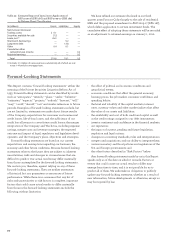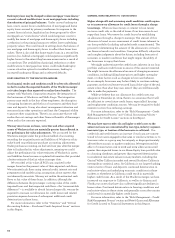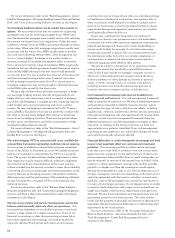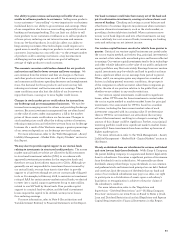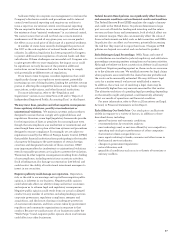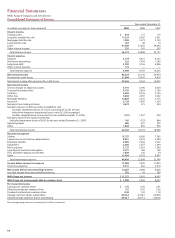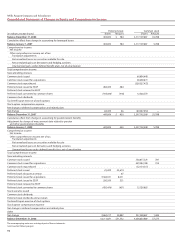Wells Fargo 2009 Annual Report Download - page 89
Download and view the complete annual report
Please find page 89 of the 2009 Wells Fargo annual report below. You can navigate through the pages in the report by either clicking on the pages listed below, or by using the keyword search tool below to find specific information within the annual report.
Sarbanes-Oxley also requires our management to evaluate the
Company’s disclosure controls and procedures and its internal
control over financial reporting and requires our auditors to
issue a report on our internal control over financial reporting.
We are required to disclose, in our annual report on Form 10-K,
the existence of any “material weaknesses” in our internal control.
We cannot assure that we will not find one or more material
weaknesses as of the end of any given year, nor can we predict
the effect on our stock price of disclosure of a material weakness.
A number of states have recently challenged the position of
the OCC as the sole regulator of national banks and their sub-
sidiaries. In addition, legislation has been proposed in Congress
to permit additional state regulation of national banks and their
subsidiaries. If these challenges are successful or if Congress acts
to give greater effect to state regulation, the impact on us could
be significant, not only because of the potential additional
restrictions on our businesses but also from having to comply
with potentially 50 different sets of regulations.
From time to time Congress considers legislation that could
significantly change our regulatory environment, potentially
increasing our cost of doing business, limiting the activities we may
pursue or affecting the competitive balance among banks, savings
associations, credit unions, and other financial institutions.
For more information, refer to the “Regulation and
Supervision” section in our 2009 Form 10-K and to “Report of
Independent Registered Public Accounting Firm” in this Report.
We may incur fines, penalties and other negative consequences
from regulatory violations, possibly even inadvertent or
unintentional violations. We maintain systems and procedures
designed to ensure that we comply with applicable laws and
regulations. However, some legal/regulatory frameworks provide
for the imposition of fines or penalties for noncompliance even
though the noncompliance was inadvertent or unintentional and
even though there was in place at the time systems and procedures
designed to ensure compliance. For example, we are subject to
regulations issued by the Office of Foreign Assets Control (OFAC)
that prohibit financial institutions from participating in the transfer
of property belonging to the governments of certain foreign
countries and designated nationals of those countries. OFAC
may impose penalties for inadvertent or unintentional violations
even if reasonable processes are in place to prevent the violations.
There may be other negative consequences resulting from a finding
of noncompliance, including restrictions on certain activities.
Such a finding may also damage our reputation (see below) and
could restrict the ability of institutional investment managers to
invest in our securities.
Negative publicity could damage our reputation. Reputation
risk, or the risk to our earnings and capital from negative public
opinion, is inherent in our business. Negative public opinion
could adversely affect our ability to keep and attract customers
and expose us to adverse legal and regulatory consequences.
Negative public opinion could result from our actual or alleged
conduct in any number of activities, including lending practices,
corporate governance, regulatory compliance, mergers and
acquisitions, and disclosure, sharing or inadequate protection
of customer information, and from actions taken by government
regulators and community organizations in response to that
conduct. Because we conduct most of our businesses under the
“Wells Fargo” brand, negative public opinion about one business
could affect our other businesses.
Federal Reserve Board policies can significantly affect business
and economic conditions and our financial results and condition.
The Federal Reserve Board (FRB) regulates the supply of money
and credit in the United States. Its policies determine in large
part our cost of funds for lending and investing and the return
we earn on those loans and investments, both of which affect our
net interest margin. They also can materially affect the value of
financial instruments we hold, such as debt securities and MSRs.
Its policies also can affect our borrowers, potentially increasing
the risk that they may fail to repay their loans. Changes in FRB
policies are beyond our control and can be hard to predict.
Risks Relating to Legal Proceedings Wells Fargo and some of
its subsidiaries are involved in judicial, regulatory and arbitration
proceedings concerning matters arising from our business activities.
Although we believe we have a meritorious defense in all material
significant litigation pending against us, there can be no assurance
as to the ultimate outcome. We establish reserves for legal claims
when payments associated with the claims become probable and
the costs can be reasonably estimated. We may still incur legal
costs for a matter even if we have not established a reserve.
In addition, the actual cost of resolving a legal claim may be
substantially higher than any amounts reserved for that matter.
The ultimate resolution of a pending legal proceeding, depending
on the remedy sought and granted, could materially adversely
affect our results of operations and financial condition.
For more information, refer to Note 14 (Guarantees and Legal
Actions) to Financial Statements in this Report.
Risks Affecting Our Stock Price Our stock price can fluctuate
widely in response to a variety of factors, in addition to those
described above, including:
• general business and economic conditions;
• recommendations by securities analysts;
• new technology used, or services offered, by our competitors;
• operating and stock price performance of other companies
that investors deem comparable to us;
• news reports relating to trends, concerns and other issues in
the financial services industry;
• changes in government regulations;
• natural disasters; and
• geopolitical conditions such as acts or threats of terrorism or
military conflicts.





